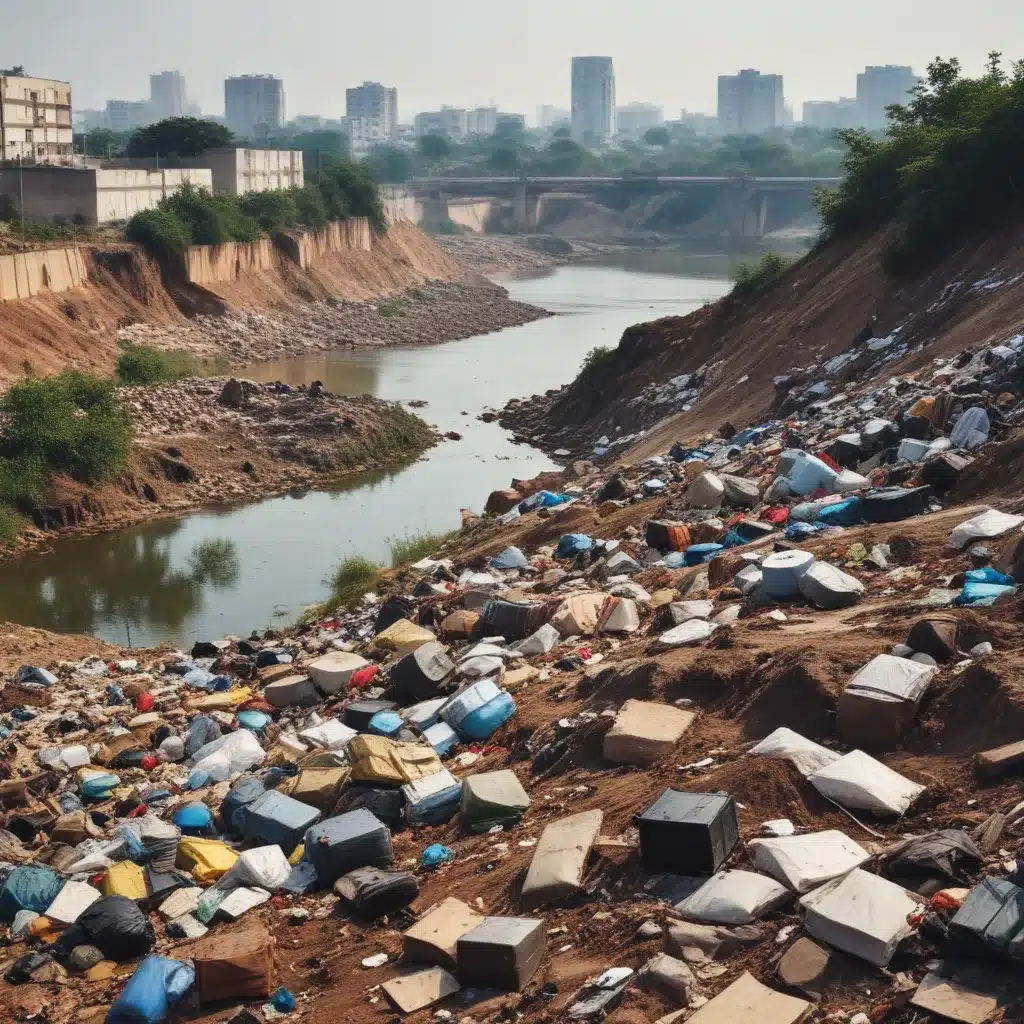
The Looming Crisis of Improper Waste Management
Hyderabad, the vibrant capital of Telangana, faces a growing crisis as its water quality deteriorates due to the alarming issue of illegal dumping and improper waste disposal. The city, known for its rich heritage and bustling technology hub, is now grappling with the detrimental environmental and public health consequences of mismanaged waste.
Across the city, unauthorized dumping sites have become a common sight, with piles of trash lining the streets and spilling into the city’s waterways. This uncontrolled disposal of waste not only pollutes the air and soil but also contaminates the precious water resources that the city depends on. The Musi River, which flows through the heart of Hyderabad, has become a repository for industrial effluents, household waste, and plastic pollution, posing a grave threat to the health and well-being of the surrounding communities.
Quantifying the Impacts: Plastic Pollution in the Musi River
A recent study conducted by researchers from the Hyderabad-based Osmania University shed light on the alarming levels of plastic pollution in the Musi River. The study, published in the Frontiers in Sustainability journal, revealed that the river’s water is contaminated with a diverse array of plastic waste, including polyethylene, polypropylene, and polystyrene. The researchers found that the river’s plastic pollution levels are on par with some of the most polluted waterways in the world, with an estimated 40 percent of the total solid waste in the river being plastic.
The consequences of this plastic pollution are far-reaching. As the plastics break down over time, they release harmful chemicals and microplastics into the water, which can bioaccumulate in the aquatic ecosystem and pose a significant threat to the health of the surrounding communities. The study found that the local fishing community, who rely on the Musi River for their livelihoods, are particularly vulnerable to the negative impacts of this pollution.
Pharmaceutical Pollution: A Pressing Concern
In addition to the plastic pollution, Hyderabad also faces the challenge of pharmaceutical pollution in its water bodies. According to a report by Nordea, the city’s thriving pharmaceutical industry has led to the release of untreated effluents and active pharmaceutical ingredients (APIs) into the city’s water system, including the Musi River. This has resulted in the presence of various pharmaceutical compounds, such as anti-inflammatory drugs, antibiotics, and antidepressants, in the city’s drinking water and agricultural irrigation systems.
The impacts of pharmaceutical pollution can be devastating. These compounds can disrupt the delicate balance of aquatic ecosystems, harm wildlife, and pose significant health risks to the local population. Exposure to these pollutants has been linked to the development of antibiotic-resistant bacteria, endocrine disruption, and other adverse health effects.
Community Engagement and Advocacy: Driving Change
Addressing the complex issue of Hyderabad’s water quality requires a multifaceted approach that engages the local community, policymakers, and various stakeholders. The World Bank has emphasized the importance of community involvement in addressing the plastic pollution crisis in the Indus River Basin, which is similar to the challenges faced in Hyderabad. By empowering citizens to participate in the decision-making process and raising awareness about the impacts of improper waste disposal, the city can foster a sense of ownership and responsibility toward sustainable water management.
Furthermore, advocacy efforts must be directed toward policymakers and local authorities to strengthen the legal and regulatory frameworks governing waste management and environmental protection. This includes the development of comprehensive waste management plans, the enforcement of strict regulations on industrial effluent discharge, and the implementation of effective waste collection and recycling programs.
Towards a Sustainable Future: Integrated Waste Management Strategies
To address the multifaceted challenges of Hyderabad’s water quality, a holistic and integrated approach to waste management is essential. This approach should encompass the following key elements:
-
Strengthening Waste Collection and Disposal Infrastructure: Investing in the expansion and improvement of the city’s waste collection and disposal systems, including the development of sanitary landfills and waste-to-energy facilities, can significantly reduce the amount of waste that ends up in the city’s waterways.
-
Promoting Recycling and Resource Recovery: Encouraging the recycling and reuse of materials, particularly plastics and pharmaceutical waste, can help divert valuable resources from the waste stream and reduce the environmental impact of disposal.
-
Enhancing Industrial Wastewater Treatment: Implementing stricter regulations and enforcement mechanisms to ensure that industrial facilities effectively treat their wastewater before discharge can help mitigate the impact of pharmaceutical and other chemical pollutants.
-
Fostering Community Engagement and Awareness: Engaging with local communities through education campaigns, community clean-up initiatives, and the involvement of civil society organizations can empower citizens to become active participants in the solution.
-
Strengthening Regulatory Frameworks and Enforcement: Developing comprehensive policies and regulations that address the various aspects of waste management, from collection and disposal to the management of hazardous waste, and ensuring effective enforcement can help create a more sustainable and accountable system.
By implementing these integrated strategies, Hyderabad can work towards a future where its water resources are protected, the health and well-being of its citizens are safeguarded, and the city’s natural ecosystems can thrive. The Joint Action for Water blog is committed to sharing insights and best practices that can inspire and guide other cities facing similar challenges in their quest for sustainable water management.

